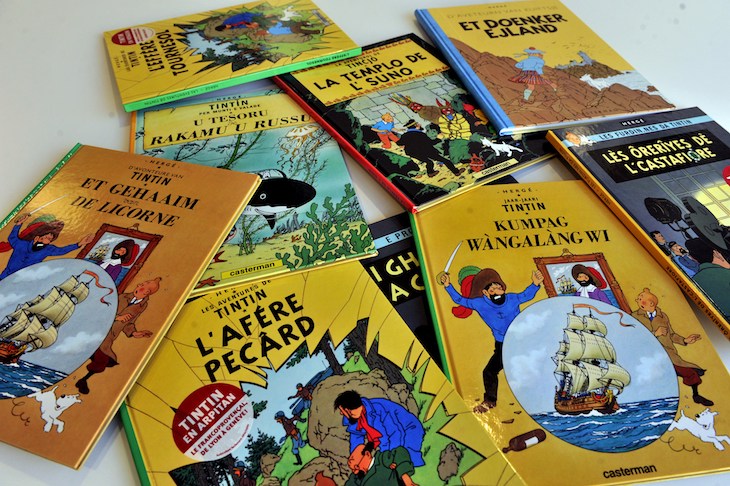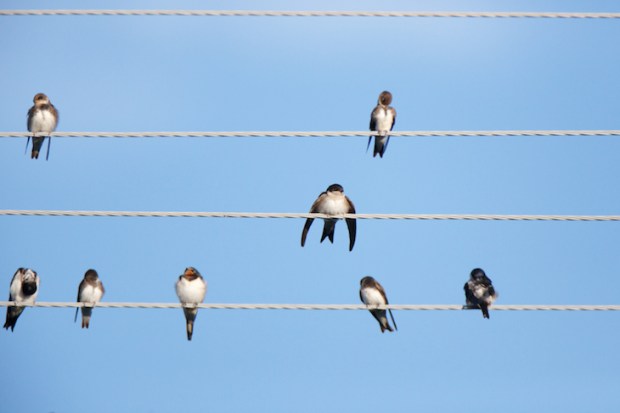The swifts had not arrived by June, nary a one, though a Yorkshire Dales friend reported their return, and there were masses in France. I read that there was a national shortage, bird people were doing surveys and panicking. In the 1970s and 1980s, swifts wheeled round every church tower, dashed through the streets screaming. Not now. I could have wept. Possibly I did. Why had the French ones not crossed the Channel? Was this yet another thing to be blamed on Brexit? Then, one July evening, there they were a few, then dozens, soaring, diving, swooping, crossbows in the blue sky. I have abandoned work, reading, watering, even drinking my wine, to sit watching these most beloved hirundines. Gaze while you can. Neglect everything. These are not birds, they are angels.
How many times have I started to read Proust, In Search of Lost Time? We all long to revisit ‘those blue remembered hills’. I have often got as far as finishing Book 1 and starting Book 2; I know the first paragraphs, about the boy waiting for his mother to come and kiss him goodnight, by heart. Then I have become stuck — another book has intervened and seduced me away, maybe an ‘easier’, more exciting or urgent one, or else my stick-at-it power has failed. I resolved never to try again, but Proust was not letting go as The Brothers Karamazov or Ulysses let go, recognising a lost cause. Last week, I touched my 12 volumes of Proust again, the small hardbacks in their pale blue jackets, the Scott Moncrieff translation. I’ve had them for decades. I pulled out Book 1 yet again. Started. Continued. Now I am on Book 5, ‘The Guermantes Way’. A key turned in a lock and Proust was ready for me. Heavens, I am 76; I first tried when I was 18. ‘To every thing there is a season.’ Proust for old age then.
It is a short car journey to Cley beach, with a flask of coffee, fold-up chairs, books, writing pads, binoculars, Poppy the border terrier. There are never many others there before ten, even in the dreaded school holidays. Yesterday was a silvery-golden morning, sapphire sea, azure sky, tide on the turn. A couple of fishermen gently casting or spinning. Labradors, retrievers, spaniels, racing to plunge, crash-splash into the water. Retired couples wandering along holding hands. A toddler wearing only a sun hat, clearing the beach of pebbles. The waves cream gently over at the edge, reminding me of the little people who ‘live on crispy pancakes. Of yellow tide-foam’. A fishing boat makes for shore with its load of lobster pots. Cormorants skim fast. Terns plummet fast down for fish. A seal bobs up. It is wonderfully peaceful, with a breeze even on the hottest days. I feel my childhood years by the North Sea returning, to wash over me on the incoming tide.
We have a pond and in that pond there are eels. From being ten a penny and jellied as cheap food for the poor, eels are now very rare (though they are farmed in some places, like everything else). The writer Duncan Fallowell tells me that years ago he used to see hundreds of them slipping down the drains in Truro. University College London has teamed up with local conservation orgs for the Glaven Valley eel project. Excited aquatic studies postgraduates and their bosses arrived with special nets and trawled our pond, with great results. The nets contained large and small eels — 16 last count —which they measured (stretching them out gently) before anaesthetising them briefly (I kid you not), tagging them electronically and releasing them. These eels will emerge silently one night and slither off through the grass to the river, the start of the journey to their breeding grounds in the Sargasso sea. This is even more amazing than the journey of our swifts. I applaud the marine biologists, whose enthusiasm is oddly infectious, and I am delighted they are striving to turn the eel tide — I just won’t go down to the meadow in long grass with bare feet. Any feet.
It rained every day for our June in France this year, but things looked up when I found a market bookstall selling new Tintin hardbacks at half price. Ah, Tintin, Milou the dog (far better than his translated name of Snowy), Thomson and Thompson, the bearded villains, the mad professors. Rereading them gives me delight and keeps my French going. Tiens! has become a family word. Hergé was a genius sans pareil. My favourite story has to be Les Bijoux de La Castafiore, but they’re all wonderful. Back home, where rain was a forgotten word, I sat in the shade with iced coffee and Tintin et Le Crabe aux Pinces d’Or. This is the life, readers!
Got something to add? Join the discussion and comment below.
Get 10 issues for just $10
Subscribe to The Spectator Australia today for the next 10 magazine issues, plus full online access, for just $10.
You might disagree with half of it, but you’ll enjoy reading all of it. Try your first month for free, then just $2 a week for the remainder of your first year.















Comments
Don't miss out
Join the conversation with other Spectator Australia readers. Subscribe to leave a comment.
SUBSCRIBEAlready a subscriber? Log in